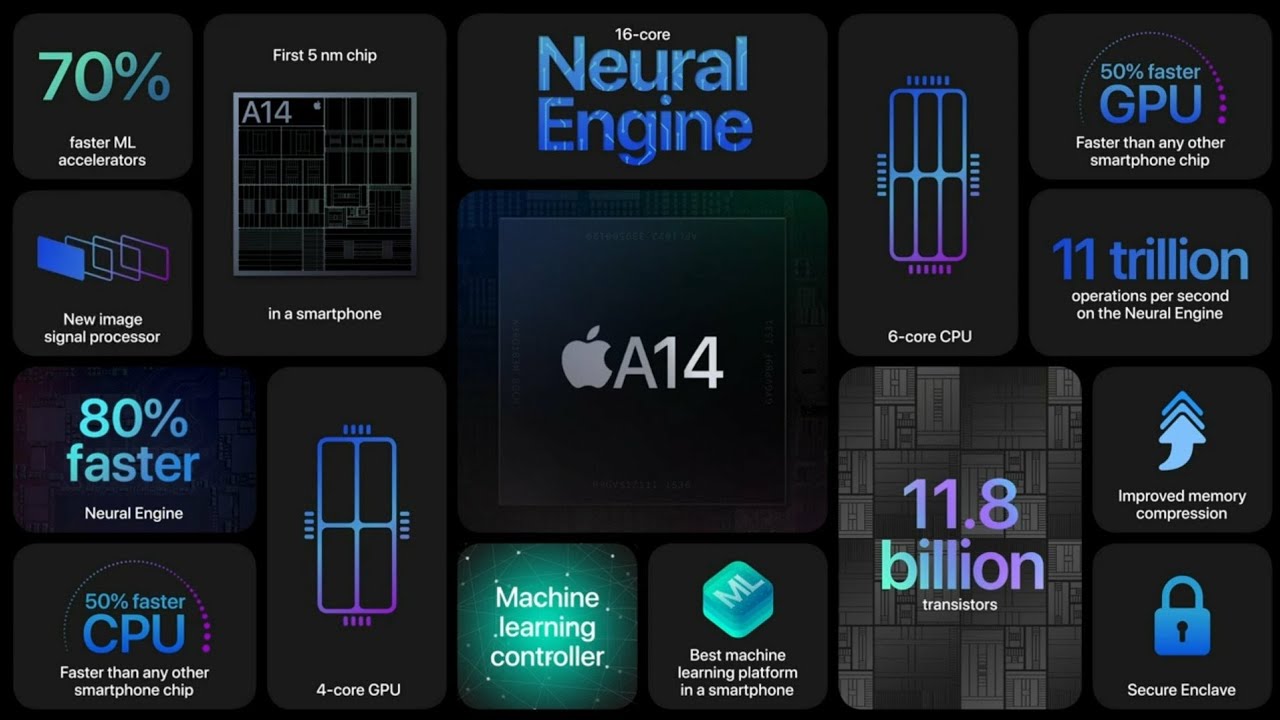Understanding The Fastest Smartphone Chips: A Comprehensive Guide
Introduction
In an age dominated by digital technology, smartphones play an integral role in our everyday lives. They handle most of our digital needs, from communication to entertainment, and their performance affects how we live and work. At the heart of these devices are the smartphone chips, tiny components that make everything possible. In this comprehensive guide, we aim to understand the fastest smartphone chips, their significance, how they impact the user experience, and look forward to what future developments may occur.
What Is a Smartphone Chip?
- Definition: A smartphone chip, widely known as a System on a Chip (SoC), is the powerhouse of every smartphone. Quite similar to a computer's central processing unit (CPU), the chip is a compact unit that contains multiple key mobile device components.
- Interpreting and executing instructions: The processor, lodged inside the chip, is the workhorse. This vital component is in charge of understanding and implementing the given instructions.
- Mathematical and logical operations: The processor also handles the mathematical and logical operations essential for the functioning of the smartphone.
- Coordination: More crucially, the processor takes up the responsibility of directing the activities of all the other hardware in the smartphone. This ensures the smooth running of the entire system.
This combination of tasks exemplifies the crucial role of the smartphone chip, demonstrating that it goes beyond the initial assumption of it merely being a component; rather, it's the heart of every smartphone.
Why Are Smartphone Chips Important?
Understanding the value of smartphone chips requires a closer look at the multifaceted attributes they offer and how they significantly influence smartphone functionality. Here are key reasons why the importance of smartphone chips cannot be overstated:
- Processing Power & Speed: Chips command the processing prowess and speed of a smartphone. This impacts how rapidly applications initiate and the smoothness of their operation. Superior chips equate to enhanced multitasking capabilities and high-resolution graphics.
- Energy Efficiency: The chip's power efficiency critically determines the device's battery longevity. More advanced and efficient chips can run more demanding tasks without quickly draining the battery, extending the phone's usability duration on a single charge.
- Enhanced Features: The quality and sophistication of a chip influences several phone specifications, such as image quality. Top-tier chips allow smartphones to feature high-definition cameras that can capture vibrant, finely-detailed images.
- AI Integration: Modern smartphone chips now enable integrated artificial intelligence technology. This propels a multitude of advancements, from sophisticated voice-command recognition to advanced image processing, increasing the overall user experience.
In essence, the chip serves as the heart of the smartphone and its importance lies in informing the user's overall experience, from the efficiency of their device, through to the clarity of images captured with their camera.
What Are the Fastest Smartphone Chips on the Market Today?
The world of smartphone chips is filled with continuous competition, as companies constantly strive to outshine one another with ever-impressive speed capabilities. Today, the market's fastest chips can arguably be designated to Qualcomm's Snapdragon 888 and Apple's A14 Bionic. Let's delve into their performance and the benefits they bring to smartphone users.
Apple's A14 Bionic: Is it Wearing the Crown?
Powering the latest series of iPhones, the A14 Bionic chip is made using a sophisticated 5nm process and exhibits both speed and efficiency improvements of around 20% over its previous generation. An in-depth look at this chip reveals:
- High-speed performance: Endows the phone with the speed to load applications faster, ensuring smoother operations.
- Energy efficient: Improvements in energy efficiency lead to longer battery life, enhancing user experience.
- AI integration: Augmented Artificial Intelligence capabilities enable smoother executions of AI-based applications.
- Graphic processing: Packed with an exceptional Graphic Processing Unit (GPU), this chip promises high-resolution experiences for gamers and binge-watchers.
Qualcomm's Snapdragon 888: A Revolutionary Game-genie?
Qualcomm's Snapdragon 888 rivals the Apple A14 in the realm of top-tier chips. This chip is fabricated using a 5nm process, and brings major improvements to CPU, GPU, AI, and camera functionalities, making it an appealing choice for Android users. Here's what it offers:
- Speed and efficiency: Promises significant improvements in CPU and GPU speed, facilitating prompt loading and smooth running of applications.
- Enhanced camera functions: Supports higher camera functionalities, providing superior image and video results.
- 5G Support: Designed with full 5G support, it ensures high-speed network connectivity for advanced online experiences.
- AI advancements: Improved AI integration caters to the execution of AI-driven applications more balancedly.
In conclusion, both chips are truly engineering marvels, each offering top-notch speed and a plethora of visual delights to enhance the user experience. Choosing between the two would depend on individual preferences and brand loyalty.
How Does the Speed of Smartphone Chips Impact User Experience?
The capabilities of smartphone chips, particularly their speed, play a crucial role in improving and shaping the overall user experience. Here's a more detailed explanation of how the speed of smartphone chips enhances user experience:
1. Fast and Efficient App Execution: A faster chip enables quick loading times and smooth operation of applications, whether they are simple ones like weather apps or more complex ones like video editing programs.
2. Impressive Multi-tasking: Higher speed chips support better multi-tasking. This means users can switch between various applications smoothly and without experiencing a slowdown or lag.
3. Premium Media Streaming: Enhanced chip speed allows for high-quality media streaming. Faster chips ensure videos, whether on YouTube or Netflix, stream seamlessly and without annoying buffering intervals.
4. Quicker Application Launch: Applications with heavy 3D graphics or intensive computing needs launch quickly and run smoothly with faster chips. This feature is particularly beneficial for gamers and professionals who use complex apps.
5. Web Page Loading Time: The chip's speed can affect how quickly web pages load, improving the overall browsing experience. With a faster chip, users can enjoy swift and seamless browsing.
6. Optimized Battery Life: Despite their high speed, modern smartphone chips are designed to optimize power use and extend the device’s battery life. Superior speed combined with power efficiency results in longer battery operation.
In addition to these, a faster chip can also enable impressive gaming experiences by supporting high-resolution graphics and reducing latency in online play. It can also enhance productivity apps, enabling more efficient execution of tasks.
According to a 2019 AppAnnie study, an average smartphone user spends up to 3 hours a day on mobile apps. A faster chip can significantly improve these 3 hours spent on the phone by optimizing application performance, supporting multitasking, enhancing online gaming, and enriching media consumption experiences.
In summary, the speed of the smartphone chip has a comprehensive impact on the user experience, motivating chip manufacturers to continually push the boundaries of chip speed and efficiency.
What Does the Future Hold for Smartphone Chips?
As the landscape of digital technology unfolds, the future of smartphone chips looks vibrant and dynamic. Here are some key projections about what lies ahead:
- Increased Speed and Efficiency: Smartphone chips will continue to evolve, delivering greater speed and more power-efficient performance. This progression will make smartphones even faster, more responsive, and surprisingly power efficient.
- Advanced 5G Integration: The advent of 5G technology promises high-speed internet connectivity. As such, future smartphone chips will likely incorporate advanced 5G modules for seamless connectivity.
- Enhanced AI Capabilities: Artificial Intelligence (AI) is becoming a core element in smartphones. Future chips are expected to have enhanced AI engines for more intelligent assistant features, improved privacy, user behavior prediction, and customization.

- Superior Gaming Experience: With mobile gaming on the rise, smartphone chip manufacturers will deliver improved graphical performance and speed, turning smartphones into full-scale gaming devices.
- Eco-Friendly Designs: As environmental concerns gain momentum, future chips are likely to adopt eco-friendly design principles, prioritizing energy efficiency, and using sustainable materials.
To sum up, the future of smartphone chips revolves around speed, efficiency, connectivity, AI, gaming, and sustainability, creating an exciting era for most smartphone users.
Conclusion
The speed of smartphone chips directly influences the user experience. Faster chips ensure smooth app execution, efficient multi-tasking, and high-quality media streaming. Improved speed means applications launch quicker, web pages load in a snap, and the overall operation of the device feels slick and responsive.
In gaming, for instance, faster chips enable high-resolution graphics and lag-free gaming experiences. They accommodate intensive applications and reduce latency in online activities. The speed also impacts productivity apps, helping users to work more quickly and efficiently.
The speed of the smartphone chip can also impact battery life. High-speed yet efficient chips can provide longer battery life, optimising power use during demanding tasks.
Related FAQs about what is the fastest smartphone chip
What are the main considerations when comparing smartphone chips?
Key considerations involve assessing a chip's processing power, energy efficiency, and feature-enhancements. This includes evaluating performance speed, battery longevity impact, and the chip's ability to support advanced features such as high-quality imaging and integrated artificial intelligence.
Can the speed of a smartphone chip impact battery life?
Absolutely, a smartphone chip's speed can directly impact battery life. Modern chips are designed to balance speed and power efficiency, so a fast and efficient chip can execute tasks rapidly without draining the battery quickly.
How do smartphone chips impact mobile gaming performance?
Smartphone chips significantly impact gaming performance. A chip with high-speed processing power ensures smooth gameplay, supports high-resolution graphics, reduces latency in online play, and allows quicker game loading times.


